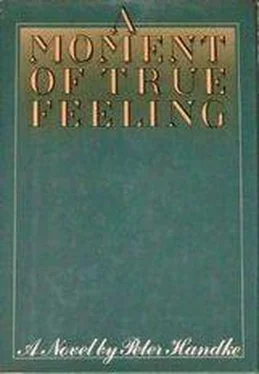Here we go, thought Keuschnig, and the bite he had just taken of a peach became tasteless in his mouth. “Even here in France,” he said aloud, “the fruit doesn’t taste like anything any more.” “We were talking about you before you came in,” said the writer. Keuschnig asked no questions, though he was curious to know what they had said. “There’s nothing to say about me,” he said. Stefanie was looking at him from the side. That disturbed him, but he didn’t want to justify her by returning her look. Above all, I mustn’t grin as if I’d been caught out! He thought of the sleeping child and wanted to rest his head on the table and fall asleep. From the hallway he heard water trickling in the plumbing of the apartment upstairs, and suddenly he started scratching the base of his nail as he had done years before, in order to see the moon underneath. In the next moment a ball-point clicked, and he gave a start. Now the catastrophe, he thought. He has found out who I really am. He stood up, went to the window, and quickly drew the curtain; now, at least, no outsider would see what was about to happen. He remembered something Stefanie had once said at the sight of Agnes and another child sitting surrounded by toys but not knowing what to do. “They can’t play any more,” she had said. I can’t play any more, he thought, and a blood vessel under his eye twitched almost soothingly. He wanted to prepare himself, but didn’t know how. He sat down at the table again and wound his wrist watch. Not a grain of dust on his suit. At last the ball-point was being pointed at him and Keuschnig couldn’t help grinning.
“I saw you in town today,” said the writer slowly, smacking his lips on the wine he had just swallowed. “You had changed. You always used to look the same when I ran into you now and then, but my impression of you was different each time — I felt good about that. But today you were changed, because you were trying so desperately to look the same as usual. You were so intent on seeming to be your old self that you startled me, it was like seeing a double of someone who’s just died walking down the street. You were the same, but in such a peculiar way that I only recognized you by your suit. And stop looking into my eyes, it won’t work; you can’t fool me any more that way. After Stefanie took your plate away just now, you secretly, behind your cupped hand, cleared away the peas you had spilled while eating. After every sip of wine you wiped your lip marks and fingerprints off your glass, and once when your napkin was lying on the table with the stains where you had wiped your mouth on top, you quickly turned it around — just as you turned that loaf of bread you’d bitten into. You won’t let anyone do anything for you, Gregor. You won’t even let anyone pass you the salt — as if you were afraid that in helping you someone would get close enough to see through you. What are you trying to hide?”
Keuschnig pretended to look at the writer; in reality he was watching the bubble that formed on the crepes suzette Stefanie was flaming in hot brandy sauce, and finally burst. He put the point of his knife to his forehead and thought: The only purpose of all that talk before was to make me feel unobserved. He searched the table for something to throw. Now I’m going to do it! he thought, and actually threw a chunk of bread at the writer. Not even Stefanie laughed. In a minute he would DISGRACE himself forever. Now he really looked at the writer, imploringly, and the writer turned away, not mercifully, but with the air of a man certain of his triumph and modestly proud of it; turning away from his victim, who was still alive but no longer knew it, with an elegant smile. — Keuschnig felt so ridiculous he thought his head would fall off. He realized that he had unintentionally taken on the writer’s facial expression, the same grin, the same lowered eyelids. In the general silence they exchanged the same short sly glances …
At this moment — he had a big peach stone in his mouth — Keuschnig, in full consciousness, had an experience he had never before encountered except in occasional dreams: He felt himself to be something BLOODCURD-LINGLYLY strange, yet known to all — a creature exhibited in a nest and mortally ashamed, IMMORTALLY DISGRACED, washed out of the matrix in mid-gestation, and now for all time a monstrous, unfinished bag of skin, a freak of nature, a MONSTROSITY, that people would point at, and so revolting that even as they pointed their eyes would fix on something else! — Keuschnig screamed, spat the peach stone into the writer’s face, and began to take his clothes off.
He carefully undid his tie, then laid his trousers, carefully folded, over the back of a chair. The others had stood up. The writer observed him. Françoise tried to catch the eye of Stefanie, who was looking down. The naked Keuschnig ran around the table and jumped on Françoise, who was still trying to laugh. They fell in a heap. Blindly Keuschnig thrust his hand into a plate and smeared his face with leftover stew. He chanced to touch the writer’s leg. “Don’t you butt in!” he said, and hauled off at the writer. Keuschnig rose to his feet, and they began to exchange blows, slowly, blow after blow, eye to eye, soundlessly, systematically, and with the obstinacy of children. After a while Keuschnig realized that he was going to burst out crying, with relief at no longer having to dissemble any more, with grief that it was all up with him. Ah, he thought with satisfaction, I’m crying. But he only turned away from the writer and said gleefully to Stefanie: “This afternoon at the embassy I made love on the floor to a girl whose name I didn’t even know.” —She smiled with only one side of her mouth, and he repeated the sentence to emphasize his malicious intent.
Washed anddressed again, Keuschnig asked the writer to go for a walk with him. The women had disappeared into the back room, and could no longer be heard. “As we crossed the Pont Mirabeau on our way here this evening,” said the writer, “the Seine was perfectly calm. Not a ripple.” “I’ve had enough water for today,” said Keuschnig. “Let’s go to Passy, along the railroad. I feel like walking, just walking straight ahead. I can’t do anything else any more.”
In silence they walked down the boulevard. Nearly all the windows in the tallish houses were dark, and a good many of the shutters had been let down, where people had gone on vacation. Only some of the little attic windows were still lit. What with the boulevard and the railroad cut beside it, the space between the rows of houses was so wide that the sound of their footsteps echoed back from the far side. There were no other walkers. A man and a woman were sitting in a car drawn up at the curb, but they were only looking into space. The sky was full of night clouds tinged with yellow city light, and stars could be seen in the openings between them. The breeze was so faint that only the leaves at the end of a branch or twig stirred. In the light of the street lamps behind them the branches had the look of hard black tracery, in and out of which leaves, that seemed illumined from within, played a game of light and shadow. One had to prick up one’s ears to hear the movement of the leaves; no rustling, only a soft, almost eerie breathing. Here and there among the green leaves a lone withered leaf whispered audibly. Looking out of the corners of his eyes at the slowly shifting foliage, Keuschnig suddenly saw knots of animals thrusting forward and drawing back. A black beetle fell brittly to the ground. The sidewalk was awash with fresh dog piss … Though watching nothing, Keuschnig sensed that nothing escaped him. He stood still and felt the breeze only as cool air on his temples.
As they were passing the RUE DE L‘ASSOMPTION, he remembered the Café de la Paix and the woman he had arranged to meet there the evening of the next day. He sat down on a bench, from which one could look down the long, dark, yet because of its name gratuitously promising rue de l’Assomption. He hadn’t wished for a sign, but now unintentionally he had EXPERIENCED one. Did he need it?
Читать дальше












